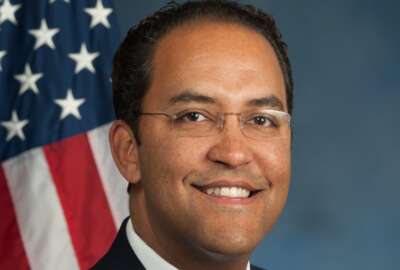
Pandemic-fueled TSP participants are withdrawing and borrowing thousands of dollars
In today's Federal Newscast: Thousands of participants, embracing the CARES Act, have taken money out of their TSPs. Furloughs at USCIS have been canceled or,...
To listen to the Federal Newscast on your phone or mobile device, subscribe in PodcastOne or Apple Podcasts. The best listening experience on desktop can be found using Chrome, Firefox or Safari.
- Nearly 33,000 participants have taken funds out of their Thrift Savings Plans under the new coronavirus withdrawal flexibilities. The Coronavirus Aid, Relief and Economic Security Act gave TSP participants, financially impacted by the pandemic, a few more options to tap into their retirement savings. Over 9,100 participants have taken a loan. And nearly 1,600 participants have taken a special CARES Act loan, over the usual $50,000 limit. Most CARES Act flexibilities with the TSP are available through the end of the year.
- Employee furloughs are canceled at U.S. Citizenship and Immigration Services, for now. USCIS says it has found a way to avoid furloughing over 13,000 employees at the end of the month. The agency has enough funding to maintain operations through the end of the fiscal year. But it cannot guarantee it will avoid furloughs after September. USCIS says it had to make unprecedented spending cuts to avoid furloughs this time. It descoped some contracts. The agency also says naturalizations and other services will take longer. (Federal News Network)
- One of the intelligence community’s biggest challenges during the coronavirus pandemic has been learning how to work in an unclassified environment. The Intelligence and National Security Alliance found in a new report that moving to a virtual environment required a shift in thinking that was slow to happen across the IC acquisition community. INSA made five recommendations for how the IC could be better prepared and more flexible during future emergencies, including documenting contracting processes and adding a clause in all contracts to address how to perform work in unclassified environments.
- President Donald Trump plans to nominate Chad Wolf to be Homeland Security secretary. That position has been vacant for more than 500 days, longer than any cabinet post in the nation’s history. Wolf has been in the role, on an acting basis, since November of last year. Performing the duties of the secretary without Senate confirmation has come under intense legal scrutiny. The Government Accountability Office says he was never properly appointed to the position, and several pending court cases argue the actions he has taken as acting secretary are invalid for the same reason. (Federal News Network)
- An ongoing contract dispute between the Social Security Administration and its administrative law judges (ALJs) spreads to a new front. A group of retired ALJs takes aim at the roster of management judges, who don’t conduct hearings. They say the 182 management judges make SSA’s hearing system bloated and top-heavy, because they oversee only 1,200 ALJs, a one-to-six ratio. The retirees urge Social Security to return some of the disability appeals caseload, which is on the rise, to the management judges.
- The National Science Foundation and the Energy Department are standing up 12 new research institutes for artificial intelligence and quantum information science research. Once established, the agencies plan to award $1 billion over the next five years to help private sector and academic partners accelerate their research in these areas. The announcement stems from a Trump administration goal of doubling federal research spending on AI by fiscal year 2022.
- The General Services Administration is testing out a new approach for a multiple-award contract. GSA is pushing price competition down to the task order level on its new ASTRO multiple-award contract. ASTRO is for manned and unmanned platforms and robotics and includes 10 operational areas ranging from data to ground to space to development and integration support. What’s different about ASTRO is for the first time, GSA is using authority granted by Congress to hold a competition where price is not a factor to win a spot on the contract. Bids are due Oct. 30.
- U.S. Cyber Command is taking a more offensive posture and it is getting less shy about saying so. In a piece published Tuesday in Foreign Affairs, Gen. Paul Nakasone argued CYBERCOM cannot wait for threats to military networks, and needs to head them off at their source. As one example, he cited a “hunt forward” mission that sent cyber operators to Montenegro to combat Russian hackers. Nakasone argued the proactive approach “imposes costs” on foreign cyber adversaries and serves as a deterrent to espionage and election interference. (Federal News Network)
- The Coast Guard Auxiliary stands up its first unit dedicated to supporting the service’s Research and Development Center. The new unit coordinates requests for assets and skills by subject matter expertise, field research activities and public affairs. Unit Coordinator Bruce Buckley will develop a skills bank to match Coast Guard research priorities to Auxiliary skill sets. The unit is expected to greatly enhance Coast Guard research.
- The first cohort of airmen have completed a new F-35 Crew Chief Upgrade Training course at Hill Air Force Base. The program aims to reduce the training backlog for new maintainers and give crew chiefs direct access to professional development opportunities. Crew chief duties include maintaining landing gear and engines, as well as swapping tires, among other tasks.
- The top Democrat on the House Oversight and Reform Committee has introduced a bill that would prevent political officeholders or donors from joining the Postal Service’s top ranks. The Nonpartisan Postmaster General Act bill would bar the postmaster general and his deputy, as well as members of the agency’s board of governors, from holding political office or engaging in political activity at least four years out from their appointment. The board’s chairman, Robert Duncan, is a former Republican National Convention chairman. And Postmaster General Louis DeJoy has donated millions to Republican candidates and causes.
- Two top lawmakers on artificial intelligence will introduce a House resolution next month aimed at accelerating AI policy. Reps. Will Hurd (R-Texas) and Robin Kelly (D-Ill.) say their resolution will include AI workforce, national security, research and ethics recommendations, in the hopes that those recommendations make their way into legislation. The lawmakers borrowed the concept from the bipartisan Cyberspace Solarium Commission, which had its top recommendations take hold in this year’s defense spending bill. (Federal News Network)
Copyright © 2025 Federal News Network. All rights reserved. This website is not intended for users located within the European Economic Area.
Peter Musurlian
Peter Musurlian is a producer at Federal News Network.
Follow @PMusurlianWFED
Related Stories
(Amelia Brust/Federal News Network)

Pandemic-fueled TSP participants are withdrawing and borrowing thousands of dollars

Top lawmakers on AI set sights on House resolution to expedite policy
Related Topics



